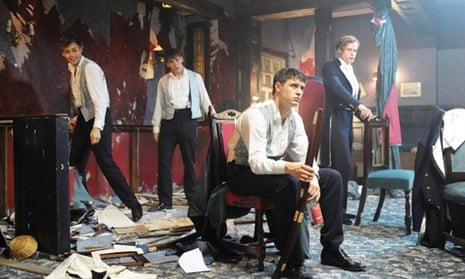After seeing The Riot Club at the Toronto film festival last year, my friend and I (who were emotionally traumatized because we thought it was going to be a comedy) described it as “a horror movie about privilege”. It was a too-real tale about what can happen under mob mentality, and as women watching it, the sexism and entitlement depicted by the film’s male characters hit hard and way too close to home.
To put it plainly, the story was gross. Which is not just a testament to director Lone Scherfig’s talent for storytelling (she also directed An Education, which is equally compelling), but to how pop culture has come to view the upper crust.
Fifteen years ago, pop culture began laying the groundwork for its backlash against elitism. On 30 March 2000, The Skulls came out, offering a thrilling take on Yale’s Skull and Bones society. But instead of emphasizing the everyday entitlement of its privileged members, it took viewers on a murder-mystery adventure: after a young man is recruited, his friend is murdered by the club’s high-ranking member, so the latest addition tries to – and eventually does – uncover the truth.
The Riot Club – based on the play Posh – offers a story just as thrilling but, tragically, far more common. After a young man named Miles is wooed by the society (a fictional Oxford supper club reportedly based on the real-life Bullingdon Club), he accompanies them to one of their legendary dinners. From there, the night unravels: infatuation with their own legacy leads to celebratory drinking among the crew, and drinking leads to drugs. The combination of those – and the members’ arrogance – results in “clouded judgment”, rants against the lower class and much worse. As you watch, you feel trapped. Not just because you want to finish the story (and because most of it takes place in a single room), but because you know that when you leave the theatre, these things will still be happening.
But The Riot Club is only the latest in pop culture’s turn on the 1%. Four years after The Skulls’ release, MTV gave us Laguna Beach, which led to The Hills – shows that evolved from glorifying and glamorizing the first-class lifestyles of its cast members to depicting just how unglamorous and upsetting things like in-fighting and battling self-esteem issues on television (thanks to unrealistic beauty expectations) really are. No longer was excess something to aspire to.
Even as Keeping Up With the Kardashians gained a following after its debut in 2007 and Made in Chelsea premiered in 2011, the characters were painted as ridiculous and out of touch. The former delivered a 72-day marriage that seemed to exist only to flaunt wealth, while the latter saw (and sees) characters jet off to Cannes and bask in their VIP statuses, as though the rest of the world doesn’t exist.
In the early to mid-2000s, there still seemed something glamorous about financially induced ignorance. Miranda Priestly tells Andie in The Devil Wears Prada that “everybody wants to be us”, and for a while that seemed true. But then Andie tosses her phone in the fountain and rejects that world, arguably reflecting the mindset that being rich, privileged and status-heavy began counting for a lot less in pop culture.

The return of Veronica Mars has also helped paint elitism as something to be worried over other than revered. At the show’s premiere in 2004, Veronica’s place at the bottom of Neptune’s society was important: because she was no longer part of the millionaire circle, she had access to real people and real problems that she could (and did) help solve. Then, when the movie came out last year, we once again saw the downfalls of living in the privilege bubble.
So are all rich, elite and privileged people potential murderers, in life or in art? Obviously not. But pop culture’s hesitance to glamorize the rich just for being that way is important. Television and film are powerful tools that can create change through conversation. The Riot Club can remind viewers that wealthy, white men still hold power, so they (and their norms) deserve to be challenged. The Skulls helped send the message that secrecy can be very scary. Reality television reminds us that money doesn’t make somebody interesting.
According to pop culture, “privileged” isn’t something to aspire to anymore. Finally, it’s something to be wary of.
- The Riot Club is released in US cinemas on Friday 27 March

Comments (…)
Sign in or create your Guardian account to join the discussion